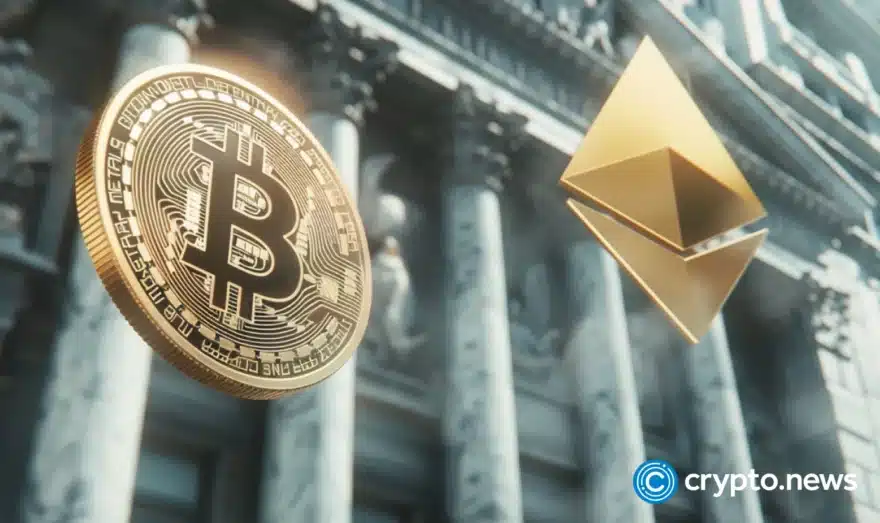What are zk-rollups? Solving Ethereum’s scalability issue

Zero-knowledge rollups (zk-rollups), a new scaling solution, can significantly boost a blockchain’s throughput and lower transaction costs. This is achieved by moving computation and data storage off the main blockchain. Learn how zk-rollups work and which projects use them.
Table of Contents
Zk-rollups are layer-2 protocols built on Ethereum that batch hundreds of transactions off-chain and generate cryptographic proofs that certify the validity of those transactions. Instead of posting transaction data on-chain, zk-rollups submit only these succinct proofs to verify the transactions are correct.
This allows the blockchain’s capacity to increase exponentially while ensuring users can still benefit from the blockchain’s security. Zk-rollups can process thousands of transactions per second at a fraction of the cost compared to transacting directly on-chain.
How ZK-rollups work
Zk-rollups have an on-chain component that holds funds and tracks account balances. Still, the actual execution of transactions occurs on a separate computational layer.
Nodes called operators collect transactions submitted by users, aggregate them into batches, and execute the transactions on an off-chain virtual machine. The operators then generate a cryptographic proof called a validity proof that mathematically guarantees the new state updates result from correctly executing all transactions in the batch.
These proofs are submitted to a smart contract on-chain along with the latest state of accounts on the zk-rollup. The contract verifies the proof is valid, ensuring the transactions were executed properly off-chain. If valid, the contract updates its state to match the zk-rollup’s.
This allows transactions in zk-rollups to be finalized instantly once proofs are verified on-chain. Users can also withdraw funds from the rollup anytime without having to wait for security challenges.
The key benefits of zk-rollups
Scalability: Zk-rollups provide orders of magnitude improvements in transaction throughput because validity proofs are much smaller than full transaction data. Thousands of transactions can be compressed into a proof just a few hundred bytes large. This is possible because zero-knowledge proofs do not have to contain the data to prove it.
Security: Zk-rollups inherit the native blockchain’s security guarantees and transaction finality. Validity proofs prevent operators from executing invalid state transitions off-chain. Furthermore, data availability on-chain allows anyone to reconstruct the zk-rollup’s state.
Low costs: Withdrawing funds from zk-rollups is seamless and cheap since transactions rely solely on proof verification, not fraud challenges. Users could also benefit from greatly reduced transaction fees thanks to compression efficiency.
No liveness assumptions: Zk-rollups are immune to denial-of-service attacks that delay transactions since proofs enforce correct state transitions. Users don’t have to monitor the network to protect funds.
Disadvantages of zk-rollups
Zk-rollups have higher computational costs than other solutions like Optimistic Rollups because calculating zero-knowledge proofs is computationally intensive. They have complex cryptographic and engineering framework. As a result, they prove to be costlier and more challenging to implement.
Zk-rollup projects
Which cryptos use ZK-rollups? Various teams are pushing forward the development and adoption of ZK-rollup technology across Ethereum layer-2 scaling solutions and decentralized applications. Scaling Ethereum is what most of those projects focus on, despite some arguing that such as system can bring even more to the table when it comes to Bitcoin (BTC).
Polygon (MATIC) has emerged as one of the most popular zk-rollup solutions. It uses recursive SNARK proofs to bundle transactions with low costs. Polygon also offers EVM compatibility, allowing developers to migrate the Solidity smart contracts used on Ethereum and Ethereum-like blockchains with minimal changes. The network’s growing ecosystem now includes over 7,000 dApps.
Powered by Cairo language and STARK-proof technology from Starkware, several efficient zk-rollup projects, such as dYdX, operate. Starkware, founded by Eli Ben-Sasson and Alessandro Chiesa, facilitates the development of rollups with developer-friendly APIs and services for exchanges and NFT platforms.
ZK-Sync, by Matter Labs, extends full EVM and Solidity support to zk-rollups. With SNARK proofs and emphasis on Ethereum interoperability, it forms a smooth link to layer-2. DeFi apps such as Aave, Yearn.Finance, and 1Inch Network are prominent adopters of ZK-Sync.
Loopring (LRC) presents a decentralized exchange protocol designed for high-volume trading. Its architecture reduces slippage and fees. Loopring’s zkRollup exchange played a pioneering role in Ethereum layer-2 adoption, and it currently supports GameStop’s NFT marketplace.
MetaMask, a leading wallet provider, is instrumental in facilitating ZK-rollup use by integrating platforms like Polygon and Loopring. It also enables effortless access to dApps across layers 1 and 2. MetaMask’s endorsement could further promote the adoption of ZK-rollup-based transactions.
What is ZkEVM and why build it
Several teams are developing zero-knowledge Ethereum Virtual Machines (zkEVMs), a technology that brings compatibility of smart contracts and the Ethereum Virtual Machine (EVM) to zk-rollups.
In simple terms, a zkEVM enables Ethereum transactions and smart contracts to function with cryptographic proof of validity. This innovation could combine the security and features of the EVM with the scalability offered by zk-rollups.
Notable projects working on zkEVM include Applied ZKP, supported by the Ethereum Foundation, Polygon zkEVM, Scroll, Taiko, and ZKSync. Though each has a unique approach, they all aim to create a decentralized zkEVM capable of managing complicated Ethereum transactions using zero-knowledge proofs.
Should a zkEVM layer-2 become fully operational, it would mark a significant step forward for Ethereum scalability. It would allow developers to use existing tools while benefiting from the high transaction speed and low costs associated with zk-rollups. The success of zkEVM initiatives could hasten the uptake of layer-2 solutions in applications based on Ethereum.
Zk-rollups vs optimistic rollups
Zk-rollups and Optimistic Rollups are two methods designed to enhance Ethereum’s efficiency, but they use different tactics. Zk-rollups bundle many transactions off-chain and use zero-knowledge proofs to verify their validity before submitting them to the blockchain. This process heightens scalability and lowers costs, despite its high computational requirements. Instant transaction finality, a feature of zk-rollups, eliminates the need for fraud proofs.
Optimistic Rollups, on the other hand, presume transactions are correct. They improve scalability by submitting minimal data to the chain and only produce fraud proofs if they spot invalid transactions. However, transaction finality is delayed until the fraud-proof challenge period ends. Despite having lower costs than zk-rollups, Optimistic Rollups do not require validity proofs for every transaction.
While Optimistic Rollups may see quicker adoption in the short-term, zk-rollups offer better privacy and security safeguards. Both solutions aim to significantly increase Ethereum’s transaction processing speed, reduce fees, and improve overall performance.
Zk-rollups and Optimistic Rollups are key technological advancements that will contribute to Ethereum’s future growth. However, the choice between the two will depend on each application’s specific needs.
The path ahead
ZK-rollups require specialized knowledge to operate, so development is still early-stage. But the technology holds promise to help Ethereum reach tens of thousands of transactions per second.
Future research is focused on making zk-rollups more decentralized and creating Ethereum Virtual Machine compatibility. This would allow zk-rollups to seamlessly support Ethereum smart contracts and decentralized applications.
As zero-knowledge technology and tooling matures, zk-rollups are poised to become a vital component of Ethereum’s long-term scaling roadmap. Widespread adoption could lead to faster, cheaper decentralized finance and web3 services for millions of users worldwide.
















